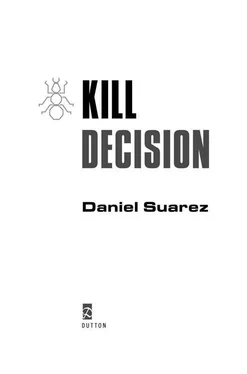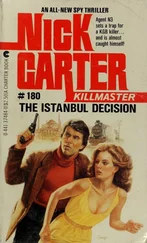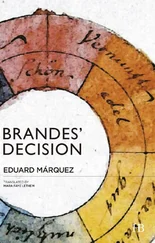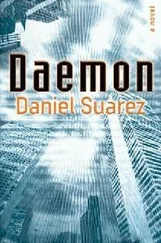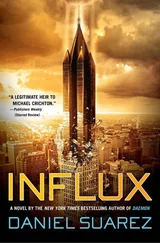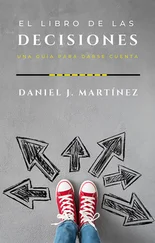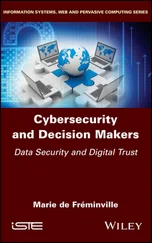Daniel Suarez - Kill Decision
Здесь есть возможность читать онлайн «Daniel Suarez - Kill Decision» весь текст электронной книги совершенно бесплатно (целиком полную версию без сокращений). В некоторых случаях можно слушать аудио, скачать через торрент в формате fb2 и присутствует краткое содержание. Жанр: Триллер, на английском языке. Описание произведения, (предисловие) а так же отзывы посетителей доступны на портале библиотеки ЛибКат.
- Название:Kill Decision
- Автор:
- Жанр:
- Год:неизвестен
- ISBN:нет данных
- Рейтинг книги:5 / 5. Голосов: 1
-
Избранное:Добавить в избранное
- Отзывы:
-
Ваша оценка:
- 100
- 1
- 2
- 3
- 4
- 5
Kill Decision: краткое содержание, описание и аннотация
Предлагаем к чтению аннотацию, описание, краткое содержание или предисловие (зависит от того, что написал сам автор книги «Kill Decision»). Если вы не нашли необходимую информацию о книге — напишите в комментариях, мы постараемся отыскать её.
Kill Decision — читать онлайн бесплатно полную книгу (весь текст) целиком
Ниже представлен текст книги, разбитый по страницам. Система сохранения места последней прочитанной страницы, позволяет с удобством читать онлайн бесплатно книгу «Kill Decision», без необходимости каждый раз заново искать на чём Вы остановились. Поставьте закладку, и сможете в любой момент перейти на страницу, на которой закончили чтение.
Интервал:
Закладка:
Strickland wondered if Prakash’s highly competitive upbringing was behind this. He knew that the guy’s father was a real type-A businessman-a real ballbuster who practically rode his sons with a riding crop. Old school. Very class conscious too.
Was that it? Strickland sometimes wondered if Prakash thought less of him simply because Strickland was straight middle class-the son of schoolteachers. He’d seen photos of the Prakash summerhouse in the south of France, and photos of Prakash literally in a polo outfit, holding the reins of a pony-like he was friends with the British royals or something. It was easy to forget that this guy might just look at him like he was one of the help.
The more he thought about it, the more it irritated him. He raised his cup again to Prakash and gave him an obnoxious wink, aiming a finger pistol at him in oily salesman fashion. “Who loves ya, guy? Eh? Who loves ya!”
Someone came up from behind and ruffled Prakash’s hair, laughing. Strickland took the opportunity to step away, heading outside for some air. He worked the room on the way out, and by the time he made it to one of the hallway doors, he could see the light on in one of the tiny, windowless offices that surrounded the lab cluster. There sat the childlike form of Nikolay Kasheyev, their visual processing expert, sitting at his desk.
Kasheyev had some sort of pituitary condition that gave him the appearance of a twelve-year-old, even though he was in his mid-twenties. He was often told he was a child prodigy, and every time people made that mistake, Strickland winced on his behalf. But the Russian seemed used to it.
He could see Kasheyev examining multiplexed video streams, tiled into squares on his screen. Strickland rapped his knuckles on the office doorframe. “Hey, Nik, why aren’t you joining the party, man?”
Kasheyev spoke without turning around. “The ravens are back.”
“What ravens?”
Kasheyev finally bothered to turn around. “You never listen to me, do you?”
Strickland was too busy wondering how much Kasheyev’s eyeglasses cost. It seemed that among the team members, only Strickland had come from humble circumstances. Everyone else seemed to have parents with money. No one else had had to work through their undergraduate years. At least not at menial jobs. It seemed like Kasheyev wasn’t even aware that they’d probably laid the groundwork for becoming wealthy men today. It was as though it barely mattered to him.
“Josh.”
“Ah. Of course I listen to you. I just don’t retain what you say.”
Kasheyev pointed to an array of six video images tiled on his screen-surveillance cameras that Strickland knew were being “watched” at all times by Raconteur algorithms. They’d had the system running more or less continually (in progressive versions) for almost two years, watching the public spaces all around the Gates building. Watching the comings and goings of students, automobiles, everything. That was part of the power of this system: persistent surveillance. Watching over time. Noticing patterns and changes to those patterns. Continuing to deduce meaning from what was seen, storing the symbolic representations, and sending alerts-in this case to Kasheyev’s iPhone-whenever anomalies were detected. Specific alerts could be created, and apparently Kasheyev had started fixating on these birds. It was the least of his eccentricities.
Kasheyev tapped at one of the images, where what appeared to be a black raven gazed at their offices from a tree branch. Clearly the video was running, because Strickland could see the leaves of the tree swaying in a slight breeze.
Strickland leaned in to examine the screen, and then examined the Raconteur log, highlighted for the entry. Raven perched in tree.
“Okay, Raconteur recognized a species of bird. We’re amazing.”
“That’s because it searched tagged Web images for comparisons-object identification is not really my point. It’s that there have never been ravens in these trees. And, look, there’s another raven here, up near the Packard Building to the south…” He clicked around the screen and brought up a larger image of another raven perched on the parapet of the architecturally modern electrical engineering building across the street. He scrolled backward in time, and Strickland could see that as the sun rose and set, the twin, but lone, ravens returned day after day-but then one day, they weren’t there. “It started a week ago. And they’ve come back every day since.”
Strickland recognized that this was one of the problems inherent in working with brilliant people: They were half-mad. Fixations on details or finding links between disconnected phenomena was a mania with some of them. He patted Kasheyev on the shoulder. “There’s this thing called ‘migration,’ Nik.”
Kasheyev looked at Strickland like he was an idiot. “Ravens don’t migrate. Adult birds like this have a range that spans miles. They don’t stay in one spot unless they’re a mated pair with a nest. And I don’t see a nest.”
“Fascinating. These birds are way more interesting than our new research funding. I say we drop everything and-”
“Look…” Kasheyev zoomed in on one of the ravens sitting in the tree, and then up to one of its legs. There was some sort of tag or transponder on it.
Strickland shrugged. “Okay, someone’s doing research on ravens. This is a university.”
“That’s what I thought too. Ravens are very bright birds, Josh.”
“Maybe they’re here on a scholarship.”
“No one is doing research on raven populations here. I checked.”
“Jesus, I thought we were working on visual intelligence software, not stalking ravens.”
“Take a closer look at the tag on its leg…” He zoomed in the high-def digital image. Then he split the screen and showed a close-up of the other bird on the opposite side of the building.
The objects on their legs looked like identical black squares.
Strickland sighed, and was happy when he noticed Wang Bao-Rong, their twentysomething Taiwanese narrow-AI expert, motioning for them to follow as he walked past in the hallway.
“What’s going on?”
Wang was tossing a brain-shaped squeaky toy in the air as he walked. “Conference call with the lawyers.”
“Oh!” Strickland pulled Kasheyev from the seat. “C’mon, Nik! The birds can wait, man.” He fell in with the rest of the crew, still sipping champagne.
Stanford University graduate science teams had already founded Hewlett-Packard, Cisco, Yahoo! and, of course, Google. And the five patent applications Strickland’s team had filed for Raconteur were potentially worth billions-especially now that the federal government was signing on to fund their work. This was the culmination of everything he’d worked for.
The team piled into a conference room, where Prakash was already standing, arms akimbo, in front of a speakerphone. Strickland was the last in and closed the door behind him.
Prakash barked at the phone. “Okay, John. The team’s all here.” Prakash looked up. “Guys, this is John Wolstein at Hartmann, Blithe, and Peale.”
A voice came over the speaker. “Hey, guys.”
Everyone chimed in greetings.
Strickland spoke up. “Tell us the good news, John.”
There was a moment of silence. Then, “Well, I wish I could do that, but I’m afraid there’s a problem.”
A hot flash ran across Strickland’s skin. Adrenaline surge. The intellectual property was everything. They’d already done a preliminary patent search. The path was clear. No one had ever taken Prakash’s novel approach.
Prakash frowned at the phone. “What do you mean, ‘problem’? What problem?”
Strickland realized that this was what Prakash was good at. He’d chew this lawyer a new asshole.
Читать дальшеИнтервал:
Закладка:
Похожие книги на «Kill Decision»
Представляем Вашему вниманию похожие книги на «Kill Decision» списком для выбора. Мы отобрали схожую по названию и смыслу литературу в надежде предоставить читателям больше вариантов отыскать новые, интересные, ещё непрочитанные произведения.
Обсуждение, отзывы о книге «Kill Decision» и просто собственные мнения читателей. Оставьте ваши комментарии, напишите, что Вы думаете о произведении, его смысле или главных героях. Укажите что конкретно понравилось, а что нет, и почему Вы так считаете.
